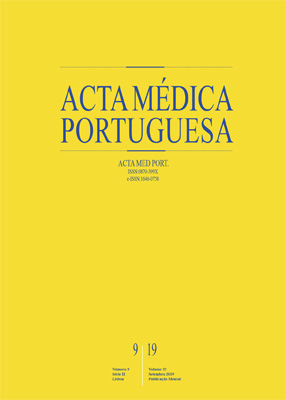Antibiotic Clinic: Two Years’ Experience in Outpatient Parenteral Antimicrobial Therapy in a Portuguese Hospital
DOI:
https://doi.org/10.20344/amp.11730Keywords:
Ambulatory Care, Anti-infective Agents, Antibacterial Drug Resistance, Infection/drug therapy, Outpatients, PortugalAbstract
Introduction: Outpatient antimicrobial therapy programs have been in place for more than four decades. They provide safe and effective treatment for a selected group of patients while reducing costs. In Europe in general, and in Portugal in particular, these programs are still a relatively new phenomenon. The aim of this study is to describe our center’s two years’ experience with such a program (Antibiotic Clinic).
Material and Methods: The cohort of treatments administered by the Antibiotic Clinic in its first two years of existence (September 12th 2016 to September 11th 2018) was analyzed and data pertaining to patients, infections, infectious agents, antimicrobials and outcomes (infection resolution, adverse events and death) were characterized.
Results: The Antibiotic Clinic treated 231 patients in 250 episodes, providing a total of 2357 days of antibiotic treatment. The urinary tract was the most common site (39.2%) and Enterobacteriaceae the most common agents (63.7% of isolates). Infections were resolved in 90.8% of treatments (95.6% of patients), adverse events were few (1.2%) and direct mortality was not found. The dropout rate was 1.6%.
Discussion: Infection resolution and adverse event rates were comparable to other centers. High treatment and low dropout rates point to high physician and patient acceptance.
Conclusion: Our experience with this program suggests it is a safe and effective alternative to inpatient admission. This is in line with current literature which suggests efforts should be made to expand this treatment modality.
Downloads
Downloads
Published
How to Cite
Issue
Section
License
All the articles published in the AMP are open access and comply with the requirements of funding agencies or academic institutions. The AMP is governed by the terms of the Creative Commons ‘Attribution – Non-Commercial Use - (CC-BY-NC)’ license, regarding the use by third parties.
It is the author’s responsibility to obtain approval for the reproduction of figures, tables, etc. from other publications.
Upon acceptance of an article for publication, the authors will be asked to complete the ICMJE “Copyright Liability and Copyright Sharing Statement “(http://www.actamedicaportuguesa.com/info/AMP-NormasPublicacao.pdf) and the “Declaration of Potential Conflicts of Interest” (http:// www.icmje.org/conflicts-of-interest). An e-mail will be sent to the corresponding author to acknowledge receipt of the manuscript.
After publication, the authors are authorised to make their articles available in repositories of their institutions of origin, as long as they always mention where they were published and according to the Creative Commons license.









